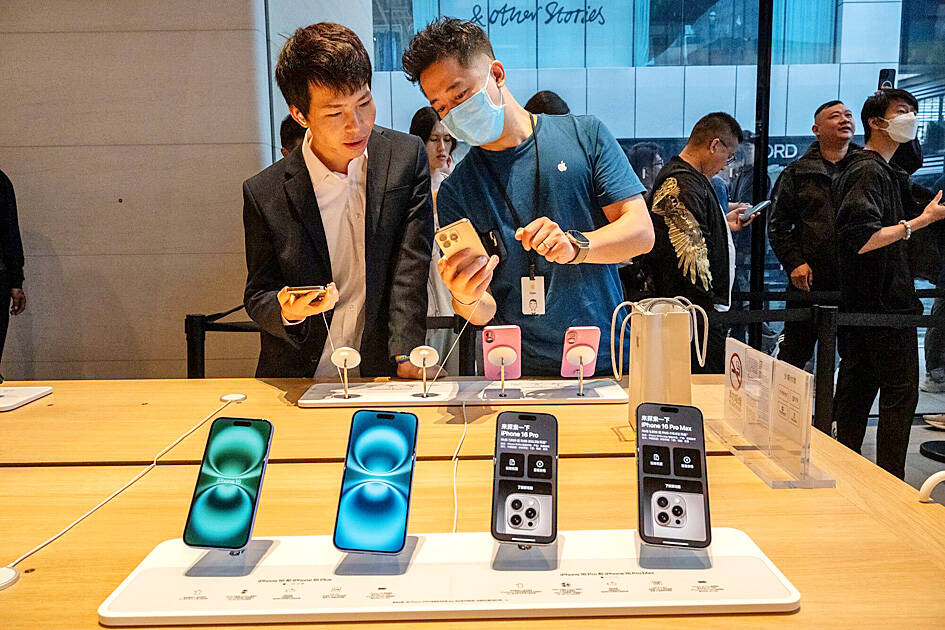Apple Inc sold 5 percent fewer iPhones and lost ground to Chinese rivals in the final quarter of last year, reflecting the absence of Apple Intelligence in its largest market outside the US.
The iPhone slipped a point to 18 percent market share last year, Counterpoint Research data showed.
Archrival Samsung Electronics Co also gave up share to faster-growing Android device makers from China, led by Xiaomi Corp (小米) and Vivo Communication Technology Co (維沃).

Photo: Bloomberg
Apple marked a 2 percent sales decline for the full year, the data showed, at a time that the wider market grew 4 percent globally.
California-based Apple has been playing catchup on artificial intelligence (AI), with its suite of AI enhancements rolling out in stages following the launch of the iPhone 16 in September last year.
Those AI additions are not yet available in any form in China, as the company is still working to secure local partners that can help provide features such as AI writing assistance and image generation.
Analysts last quarter also began warning that some investors harbored overly optimistic expectations of AI features.
“Apple’s iPhone 16 series was met with a mixed response, partly due to a lack of availability of Apple Intelligence at launch,” Counterpoint director Tarun Pathak said. “However, Apple continued to grow strongly in its non-core markets like Latin America.”
While it sold fewer units in China, Apple saw an increased proportion coming from its pricier Pro and Pro Max models, which accounted for more than half of all sales in the country.
Lenovo Group Ltd’s (聯想) Motorola and Shenzhen-based Huawei Technologies Co (華為) and Honor Device Co (榮耀) were the fastest-growing brands in the top 10, the researchers found.
China’s smartphone makers are all developing their own in-house AI tools and agents, including services that can perform tasks on a user’s behalf.

NEW IDENTITY: Known for its software, India has expanded into hardware, with its semiconductor industry growing from US$38bn in 2023 to US$45bn to US$50bn India on Saturday inaugurated its first semiconductor assembly and test facility, a milestone in the government’s push to reduce dependence on foreign chipmakers and stake a claim in a sector dominated by China. Indian Prime Minister Narendra Modi opened US firm Micron Technology Inc’s semiconductor assembly, test and packaging unit in his home state of Gujarat, hailing the “dawn of a new era” for India’s technology ambitions. “When young Indians look back in the future, they will see this decade as the turning point in our tech future,” Modi told the event, which was broadcast on his YouTube channel. The plant would convert

‘SEISMIC SHIFT’: The researcher forecast there would be about 1.1 billion mobile shipments this year, down from 1.26 billion the prior year and erasing years of gains The global smartphone market is expected to contract 12.9 percent this year due to the unprecedented memorychip shortage, marking “a crisis like no other,” researcher International Data Corp (IDC) said. The new forecast, a dramatic revision down from earlier estimates, gives the latest accounting of the ongoing memory crunch that is affecting every corner of the electronics industry. The demand for advanced memory to power artificial intelligence (AI) tasks has drained global supply until well into next year and jeopardizes the business model of many smartphone makers. IDC forecast about 1.1 billion mobile shipments this year, down from 1.26 billion the prior

People stand in a Pokemon store in Tokyo on Thursday. One of the world highest-grossing franchises is celebrated its 30th anniversary yesterday.

Zimbabwe’s ban on raw lithium exports is forcing Chinese miners to rethink their strategy, speeding up plans to process the metal locally instead of shipping it to China’s vast rechargeable battery industry. The country is Africa’s largest lithium producer and has one of the world’s largest reserves, according to the US Geological Survey (USGS). Zimbabwe already banned the export of lithium ore in 2022 and last year announced it would halt exports of lithium concentrates from January next year. However, on Wednesday it imposed the ban with immediate effect, leaving unclear what the lithium mining sector would do in the